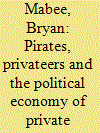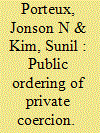| Srl | Item |
| 1 |
ID:
088900


|
|
|
|
|
| Publication |
2009.
|
| Summary/Abstract |
Historical accounts of private violence in international relations are often rather under-theorised and under-contextualised. Overall, private violence historically needs to be seen in the context of the relationship between state-building, political economy and violence, rather than through the narrative of states gradually monopolising violence. Pirates and privateers in late-seventeenth and early-eighteenth century Europe were embedded in a broader political economy of violence which needed and actively promoted 'private' violence in a broader pursuit of power. As such, the de-legitimatisation of piracy and privateering were the consequence of a number of interlinked political economic trends, such as the development of public protection of merchant shipping (through the growth of centralised navies), the move away from trade monopolies to inter-imperial trade, and the development of capitalism and industrialism. Present forms of private violence also need to be seen as part of a broader historical dynamic of war, violence and political economy.
|
|
|
|
|
|
|
|
|
|
|
|
|
|
|
|
| 2 |
ID:
148520


|
|
|
|
|
| Summary/Abstract |
This study explores collaboration between state actors and non-state specialists in the market for coercion. We focus on the case of forced evictions in South Korea, where violence carried out by private companies has occurred with the implicit, and at times explicit, sanctioning of the state. This level of government–private security cooperation has traditionally been explained by various hypotheses, including arguments about the weak capacity of a state to enforce compliance, trends in the neo-liberal marketization of state power, or as the outcome of a state being captured by the capitalist classes. Documenting the history of urban redevelopment projects and changes in government responses to major protest incidents in Korea, we instead argue that this niche market for private force is an observable implication of a shift in state–society relations in the wake of democratization. This phenomenon is, in effect, a very undemocratic response to democratization, by state elites.
|
|
|
|
|
|
|
|
|
|
|
|
|
|
|
|